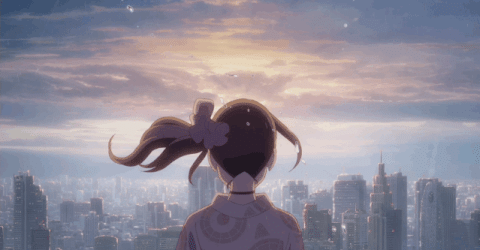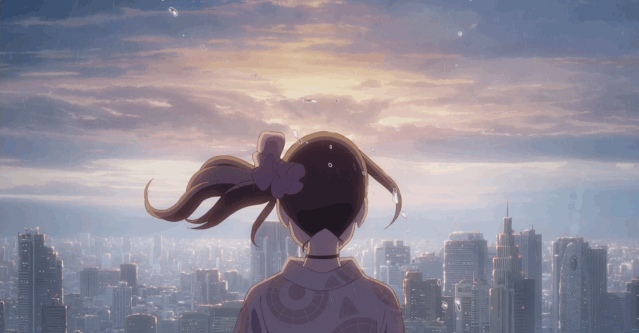
Living in Chengdu, I have long been accustomed to the gloomy sky, and I am also accustomed to the simple buildings under the gray sky.
Here, ancient Shu markets and modern culture are eclectic.
The tile eaves and wet bluestone slabs under the misty rain make people mistakenly think that it is Jiangnan.
In my sophomore year, in the early summer of June, the rain suddenly disappeared, and the long-lost sunny days appeared.
Many years later, when I watched "Weathering with You", I immediately remembered Chengdu at that time.
That summer, will there be a 100% sunny girl?
Like Hina, she made a wish and walked through the torii gate, making a contract with the gods in exchange for the sunny weather in Chengdu.

Taking advantage of the sunny weather, I quickly planned a city tour.
Chengdu has a checkerboard-like urban layout.
Its streets are not facing north and south, but deviated by 28.5° clockwise.
Since the Jinsha period, Chengdu has been facing the direction of sunrise on the winter solstice.

The first stop was Qingyang Palace. I was very interested in Taoist culture, so I took Metro Line 5 to see the Taoist temple.
There are two bronze sheep sitting in front of Sanqing Palace, which is the origin of the name of Qingyang Palace.
There are three supreme deities enshrined in the hall. After walking through the Hunyuan Hall, Taiqing Daode Tianzun has the exclusive enshrinement.

▲"Sit down"
The Twelve Golden Immortals, Queen Mother Dou Lao, the Jade Emperor, and Taoist gods gathered together.
After buying incense, I left the Qingyang Palace and walked west along the First Ring Road to the Du Fu Thatched Cottage Museum.
Du Fu once lived in Chengdu for three years, and left behind a famous saying that goes, "With tens of thousands of mansions, the poor people all over the world will be happy!"
Today, Du Fu Thatched Cottage continues to tell visitors about this experience of the poet saint in the shade of mottled trees.

▲Koi in the museum
Then, take bus No. 19 and go to Wuhou Temple Street.
Amidst the dancing shadows of the trees, I visited the only temple in China where both monarch and ministers worship together.
Next to the statue of Liu Bei, Emperor Zhaolie of the Han Dynasty, is not Liu Chan, the later emperor, but Liu Zhan, his eldest grandson who died for his country.

Jinli is next to Wuhou Temple, so I went to take a look.
Jinli is an abbreviated version of "Jinguan City".
The courtyards are winding, the streets are crisscrossed, and the lights and shadows on the waterfront tell the story of the folk customs of the Three Kingdoms period.

The next day, I took the subway, transferred to Line 1, and came to Wenshu Monastery.
The courtyard is quiet and elegant, yet still grand. It houses the relics of Master Xuanzang of the Tang Dynasty.
I learned in the temple that Tang Sanzang received full ordination at Daci Temple.
So I rushed to Chunxi Road in Chengdu's CBD area, where Daci Temple is just across the road.

▲A corner of Daci Temple
After visiting Daci Temple, rest in the Ocean Taikoo Li next door.
Taikoo Li is a modern commercial plaza, completely built in ancient Chinese style. I was fascinated, so I spent a whole afternoon shopping.

▲Ancient shopping street in Taikoo Li
Early on the third day, I rushed to Kuanzhai Alley.
The sky has not yet fully dawned, and the shops have not yet opened. There are only a few tourists in the alley with green bricks and black tiles.
The courtyard was bathed in the early morning breeze, and the chirping of birds could be heard from time to time among the branches.
Such a quiet Kuanzhai alley, you really can’t see it if you don’t get up early.
This Kuanzhai Alley was originally the residence of the Eight Banners disciples of the Qing Dynasty.
The northern alleys and western Sichuan courtyards are kneaded together to create a unique charm.

After strolling around the People's Park, I walked eastward from Renmin East Road and enjoyed the street view.
The scale of the Sichuan Science and Technology Museum is astonishing, the Tai Chi diagram in Tianfu Square, Wangfujing on the other side of the overpass, the noisy young men and women on Chunxi Road, the hot pots and vegetables in the deep alleys of East Street...

▲The statue of Mao Zedong in Tianfu Square
After crossing the Dongmen Bridge and walking south along the Jinjiang River, I came to Jiuyan Bridge.
There is a nationally famous bar street here.

▲Seven days a week, not a single day is empty
I have long heard that countless famous singers have come out of the folk bar in Jiuyanqiao.

▲Where dreams begin
Li Yuchun, Zhang Liangying, etc. are all authentic Chengdu people.
Many popular songs were born on those singing stages with dappled lights.

The wind on the river was refreshing and warm, and amid the flashing neon lights, I took a deep breath of the night air.
"Remember, this is the taste of Chengdu."
In his junior year, Zhao Lei's song "Chengdu" became popular all over the country. At first glance, I don’t think it’s that special, it’s just an ordinary ballad.

▲The tavern on Yulin East Road
It wasn't until I returned home during the winter vacation that I realized how popular "Chengdu" had become. When taking a taxi or going shopping, everyone is playing this song. Even when going to KTV, everyone is competing to sing it.
I tried to escape and try my best to imagine what kind of Chengdu a person who has never lived in Chengdu would get from this ballad.
After being a resident for several years, I no longer have a casual appreciation attitude toward Chengdu.
Walking through the subway and the sea of people every day, I experience my own daily life.
Unable to imagine it, I gave up.
The romantic longing for Chengdu should be left to those who have never been to Chengdu.
After all, Chengdu is connected to my not-so-muddy but mediocre college life.
During the four years of college, not many family members came. The only one who made a special trip to see me was my father.
So I asked for a full day off from school, accompanied him to Sendianqiao to buy two antiques, had lunch at a Sichuan restaurant, and then found a tea shop in Kuanzhai Alley to sit down and ordered two cups of Qingcheng Snow buds.

We chatted about home and school, during which the tea was refilled twice.
"What are your plans after graduation? You never told your parents on the phone."
When I heard it, I pondered for a long time.
Should you go home and develop, stay in Chengdu, or go to a big city? I hesitated and couldn't tell.
Rather than saying that I don’t have a clear plan for the future, it’s better to say that I haven’t thought about this issue at all.
During the four years of college, I couldn’t say that I studied very hard, and there was nothing remarkable about it. It could be said that I did nothing.
I stick to my own small circle and am obsessed with foreign novels, American and British dramas and DotA.
I once thought that when students from other places came to Chengdu, they would be more or less tainted with a lazy and laid-back attitude.
Looking back now, at that time it was just an excuse to live a comfortable life for myself.
The phrase "You will not enter Sichuan when you are young, you will not leave Shu when you are old " was the anesthetic I drank on the first day I came to Chengdu.
I was immersed in the ease and comfort around me, unable to understand myself and unable to extricate myself.
In the novel "The Magic Mountain", Hans, a college student, accompanied his brother to Switzerland for treatment of lung disease. Unexpectedly, he also contracted lung disease and had to stay in a sanatorium on the mountain for eight years.
The sanatorium was filled with a morbid and decadent atmosphere, which not only infected Hans' lungs, but also paralyzed his soul.
Comfort dulled his mind and depressed his will, and he wasted his youth without realizing it.
It wasn't until World War I started that he woke up from his dream, and finally went to the battlefield and became a victim of the war.
In Chengdu, I was in the same state as Hans.
Just as the First World War was a wake-up call for Hans, the approaching graduation was a wake-up call for me.
I was panicked and in a hurry. I was not prepared for anything, but I was going to the society.
Many students have achieved great results in four years, either continuing their studies with excellent results, studying abroad, getting enviable offers, entering large companies, or boldly starting their own businesses. Looking at their complacent figures, I feel mixed emotions.
Emotions began to generalize, and I blamed my inner loss on the environment, and disgust grew in my heart.
Chengdu has become my sad place.
After graduation, I left Chengdu and went to Guangzhou for an internship.
On the day I left, I was sitting on the bus bound for the East Station, looking at the direction where I had retained my four years of youth, and my heart beat as usual.
"You bring me nothing but mediocrity, and I'm going to get rid of you. Goodbye, Chengdu."
Never again.

The weather in Guangzhou is completely different from that in Chengdu.
The clear sky and warmth swept away the decadence in my heart.
The sea breeze brought warm and moist air, and I felt more energetic than ever before.
After the rain, the sky clears, and the wind shines brightly.
"I want to start over here." I said firmly to my parents on the phone.
In Guangzhou, I worked hard and studied, trying to make up for everything I had left behind.
My hard work paid off, and a year later, I officially joined the company in Nanjing.
Outside of work and life, I often think of the past.
When I think of Chengdu, I will try my best to avoid touching the images I don’t want to think of.
I have sworn that I must face problems bravely, but I have been avoiding this experience.
Then lose it completely.
So I tried to uproot the memory, but found that the roots had penetrated deep into my soul.
I had no choice but to face its existence and be prepared to be stung at any time.
I suddenly found that the memories were not so painful anymore.
When a heart truly becomes brave, pain will take a detour without even realizing it.
Just like sailing, it doesn't matter if you deviate from the course or be overturned by a huge wave.
Once you have found the lighthouse, you will never be lost again.
“Never dwell on your mistakes.”
Leaving Chengdu was not the fundamental reason for the turning point in my life.
I just got rid of the complacency. What I left behind was the siege in my heart.
Chengdu and I have never gone far.

I used to think that past experiences constructed the present, but later I realized that the past does not determine the present.
Past experiences are meaningless. What gives experience meaning lies in how you view it.
Finally enlightened, I remember Chengdu again.

Those rainy days.
That city like smoke.
Those who are gentle.

Beautiful pictures reappeared,
That familiar land,
Suddenly at my feet.

Breathe slowly and deeply,
the smell of the air,
Just like the river breeze on Jiuyan Bridge back then.
I reached out and hugged her,
Confess your heart to your ears.

"Chengdu, wait for me to come back."




